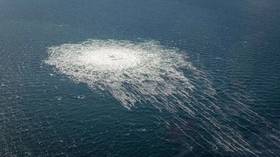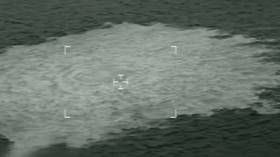Nord Stream syndrome: One year on, EU states and the US collude to sweep the pipeline attacks under the rug

It’s been more than a year since one of the biggest pieces of energy infrastructure in Europe was destroyed in what can only be described as a terror attack. One would imagine that no stone would be left unturned to investigate a crime of such magnitude and attribute responsibility.
You would also think that the countries that stood to lose most from Nord Stream’s destruction would be at the forefront of these investigations. Well, welcome to the Europe of 2023 where, in a weird case of Stockholm syndrome, it seems neither the alleged perpetrator nor indeed one of the main victims wants any more “trouble” when it comes to Nord Stream. The consensus is to let sleeping dogs lie, and considering the evidence of US involvement in the attack, that’s entirely unsurprising.
On September 26, 2022, the world’s news feeds erupted with reports of the powerful explosions which tore the landmark Russian-German gas pipelines apart, dealing a devastating blow to Berlin's, and by extension the entire EU's, energy security. Within a couple of days, Western media had seemingly solved the mystery. Publications such as Politico eagerly proclaimed that “Everything is pointing to Russia,” embracing the utterly delusional anti-logic that would make it plausible that Russia would destroy a piece of its own energy infrastructure that had been bringing it steady income. This reality, widely accepted by objective, nonaligned observers, was however lost on a slew of NATO-, US-, and EU-aligned commentators and officials. A mere four days after the explosions, US Energy Secretary Jennifer Granholm told the BBC that it “seems” Russia was behind the destruction of its own multibillion-dollar investment.
When we roll the clock forward to today, it is now patently clear that Western media have been tasked with memory-holing the entire Nord Stream affair, with Germany, Sweden, and Denmark quietly conducting separate “investigations” which conveniently exclude Russian officials while also remaining strangely low-key in Western newsfeeds. These obviously declawed investigations continue as it is increasingly accepted in the West that Russia had nothing to do with the sabotage, it now being obvious that the US and/or a proxy partner were actually behind this terror attack on European soil. More than a year after these attacks, it’s apparent that the manner in which this reality has been suppressed is possibly more sinister than the attack itself.
An often-overlooked element of the destruction of the Nord Stream pipelines is the devastating environmental impact that resulted from the explosions. Over 100,000 tons of methane gas was released into the atmosphere as four huge blasts tore through the two pipelines. A far less well known, or publicized, fact is that these pipelines were laid near an area where tons of toxic chemical weapons waste from the First World War had previously been dumped. The scale of the resulting short- and long-term impact on the seabed and atmosphere is difficult to establish, but both this and the single-biggest release of methane into the atmosphere in recent history seem to have gone generally unnoticed by the Green lobby in the EU and US. Anyone doubting the influence of this bunch should recall that on Joe Biden’s first day in office, he canceled a huge pipeline project, Keystone XL, jeopardizing thousands of construction jobs in what was seen as payback to environmentalists, whose cash and influence had been critical in his narrow electoral success.
The silence of the Green lobby on the catastrophic impact of the Nord Stream attack thus seems all the more unusual. Environmental activists across the US have rallied around calls to prevent the construction of pipelines in various regions, citing their negative environmental impact, but those same people seem remarkably quiet when it comes to the biggest pipeline-related environmental catastrophe in decades. The lack of any significant challenge regarding this act of eco-terrorism speaks volumes about the West’s selective approach to the Ukraine conflict. Green moral outrage is instantly shelved once Russia or China is the target and not the perpetrator.
The other elephant in the room is of course the fact that the US military represents the single-biggest source of carbon pollution on planet Earth. It's the largest consumer of energy in America itself and the world’s single-largest institutional consumer of petroleum. In this context it’s worth noting the endless stream of “celebrity” visitors to the court of Ukrainian President Vladimir Zelensky in Kiev, amongst them the 'Queen of Green' Greta Thunberg, who decried the destruction of the Kakhovka hydroelectric dam and the environmental impacts of war, all the while posing for grinning pictures with Zelensky and his entourage. Strangely, and maybe conveniently, the Nord Stream attack was absent from the agenda which widely condemned Russia as the architect of all of Ukraine’s past, current, and future environmental woes. Innumerable other Western “stars” have landed in Kiev to wring as much PR out of the conflict as possible, but not on one single occasion has any of these “eco warriors” dared to raise the impact of the Nord Stream attack and its aftermath. It seems that the destruction of the dam, which had no strategic benefit for the Russian military, much like the destruction of the Nord Stream pipeline, is yet another convenient way to demonize Moscow, a practice now routinely engaged in without any requirement to provide any objective or independent evidence.
Remarkably, when evidence emerged that Ukrainian forces had previously targeted the Kakhovka dam to “test” whether they could indeed strike it, this was widely ignored by Western media, and yet again, the immediate rush to blame Russia, as happened with Nord Stream, began with only a few outlets publishing slightly dissenting views.
So as the line of Hollywood stars and politicians making the pilgrimage to Kiev diminishes, along with Kiev’s chances of victory, some of the realities of the selective blindness regarding Nord Stream become all the more apparent. Zelensky’s regime in Kiev is obviously finding it more and more difficult to carry the narrative plausibly to tiring Western audiences, with manic allegations of Russian missile attacks in Poland and Konstantinovka all being embarrassingly shown to be false. Compounding the downward spiral of Ukrainian credibility is Polish Prime Minister Andrzej Duda’s recent pushback against Kiev’s demands. Add to this the recent debacle with the Ukrainian Nazi lauded in the Canadian parliament, which turned Ottawa’s show of support for Kiev into a PR disaster, and you get a distinct sense that the wheels are coming off for Zelensky and his regime. One thing is absolutely undeniable, that when this is all over, and the truth about Nord Stream and the suppressive media coverage surrounding it comes to the surface, we will probably need a dam to hold back the flood of reality that hits a Western population that gleefully consumed a grossly implausible narrative around this whole affair. Given the fact that the truth has an inconvenient tendency to emerge, it’s quite possible that one of the EU’s most energetic Russophobes, Josep Borrell, may end up regretting saying the words he never intended to turn into action at the time:
“Any deliberate disruption of European energy infrastructure is utterly unacceptable and will be met with a robust and united response.”
The statements, views and opinions expressed in this column are solely those of the author and do not necessarily represent those of RT.














